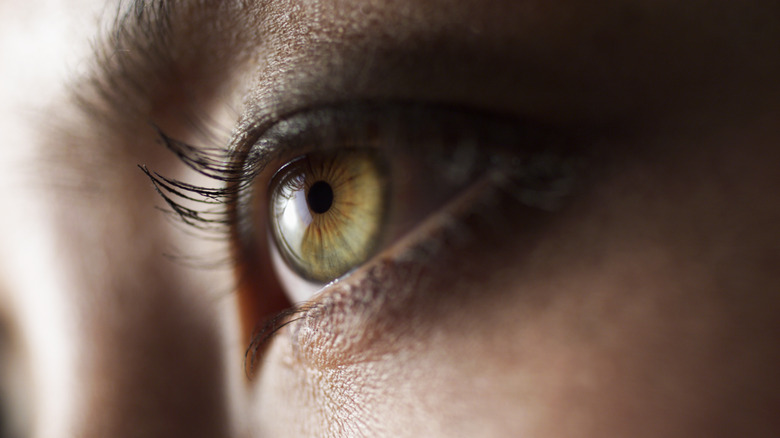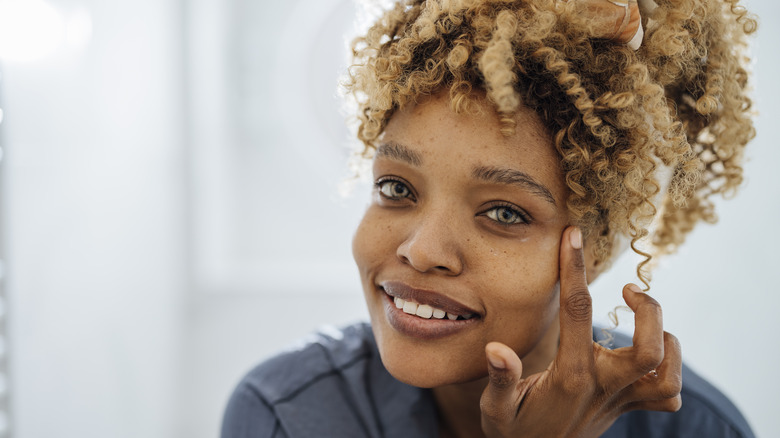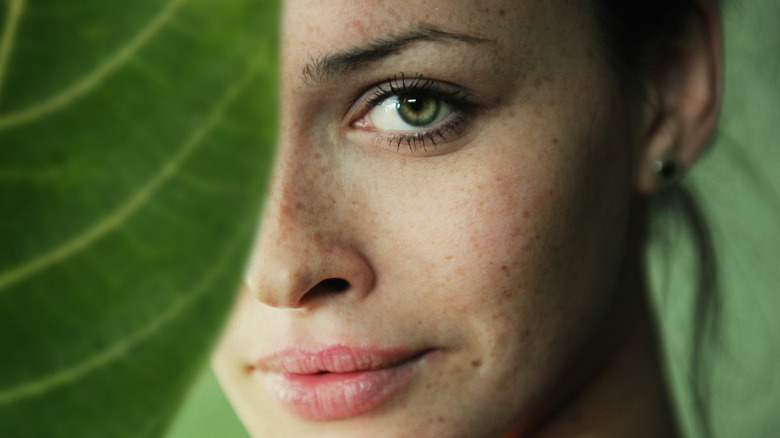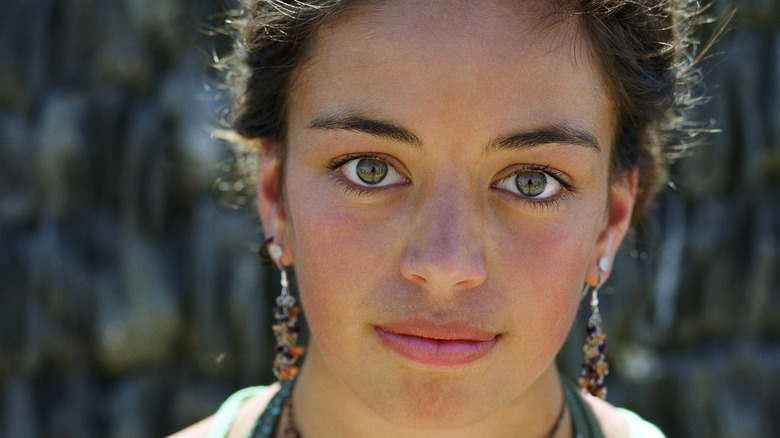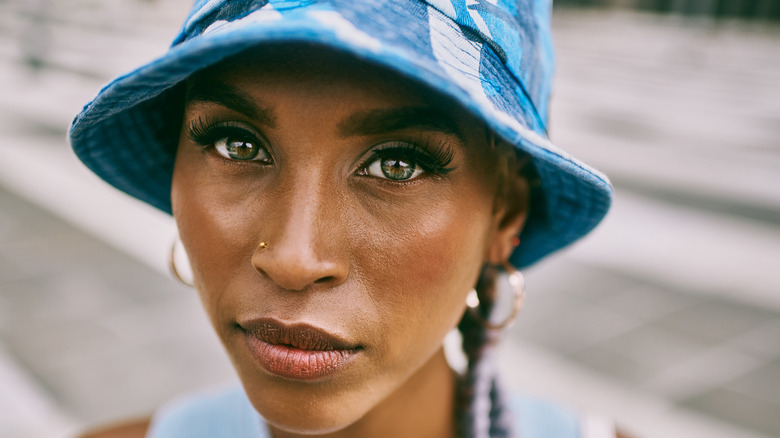Having Green Eyes May Not Always Be A Good Thing
While all eyes are beautiful, one of the most attractive eye colors is green. You don't see green eyes that often, so when you do, they really stand out due to their rarity. According to World Atlas, the United Nations estimates that only 2% of the world's population has green eyes — making them even more uncommon than grey eyes, at 3%. The majority of these green eyes can be found mostly in central and northern Europe, something that's quite evident if you've ever been to any Scandinavian countries, Ireland, or Scotland.
"The development and rarity of green eyes are influenced by intricate genetic interactions and the mixing of human populations," population genetics expert Timothy Sexton, PhD told Newsweek. Because everyone had brown eyes 10,000 years ago, according to the American Academy of Ophthalmology, Sexton explained that there's a "complex interplay" among genetics and geography that not only brought green eyes into existence, but continues to "underscore why green eyes are among the rarest eye colors."
While there's no denying that green eyes are stunning, both aesthetically and because of what it took for them to evolve from brown, they're not without their downsides. In life, beauty can't exist without some ugliness.
Green eyes are extra sensitive to light
Although no one can stare directly into the sun (nor should they), darker eyes have an easier time handling light of all intensities — which makes brown eyes quite significant for the migraine-prone people of the world. Also called photophobia, light sensitivity is more common in green, blue, and light grey eyes because these irises lack the necessary layers of pigmentation that are dark enough to block out light. Combine that with the fact that their retinas' pigment may not be very dense either, light sensitivity becomes inevitable for people with light eyes.
As ophthalmologist Anupama Horne, MD told Duke Health, photophobia as a response to light can result in squinting, struggling to focus in brightly lit places, and may even be painful. While you might not be able to avoid the harsh fluorescent lighting of an office or the direct sunlight on a clear day, you can take steps to minimize sensitivity by using screens that lessen the effects and wearing UV-blocking sunglasses when you can.
Green-eyed people might be prone to certain cancers
According to a 2022 study published in Cancer Causes and Control, people with lighter eyes like blue, green, and hazel have higher incident rates of certain types of skin cancer. As the study found, when compared to brown and other darker-colored eyes, those with green or hazel eyes have a 24% higher risk of squamous cell carcinoma (SCC) and a 16% higher risk of basal cell carcinoma (BCC) — both of which can be attributed to these people having overall lighter pigment.
In more less-than-stellar news, people with light eyes also have higher chances of developing uveal melanoma (UM), also known as eye cancer. According to a 2020 study published in the International Journal of Molecular Sciences, people with lighter eyes, green eyes even more so, are at a higher risk of developing UM. Granted, uveal melanoma is a fairly rare cancer, accounting for less than 2,000 new diagnoses a year, per the National Cancer Institute, but it's still worth knowing about and actively trying to protect your peepers.
Green-eyed people aren't easily trusted
If you have green eyes and your face just automatically grimaced at such a thing, don't worry; the blue-eyed crowd is right there with you. According to a 2013 study published in Plos One, people with brown eyes are considered more trustworthy than people with light eyes. But here's the kicker: it's the facial morphology inherently associated with dark eyes that gives these people such an appeal.
After the first part of the study in which the participants were given photos of people with various colored eyes, the researchers changed the eye colors in the photos and discovered that what the participants were judging was the facial structure that corresponded to specific eye colors. People born with brown eyes have facial features that are "stable" and "suggest happiness," while people with lighter eyes, blue for example, have a "face shape that indicates anger and, hence, lower perceived trustworthiness." So if you ever run into someone and they don't trust you because of your green eyes, you can tell them about this study and explain it's not about your eyes, but actually about your face — which may or may not be any better.Having green eyes may not always be a good thing
Green-eyed people have a higher risk of alcoholism
If there's one very obvious thing about our culture, it's that we love to drink. (Wine every night before bed, anyone?) As Charles Bukowski so eloquently put it, "If something bad happens you drink in an attempt to forget; if something good happens you drink in order to celebrate; and if nothing happens you drink to make something happen," and of course he was right. However, research has found that when it comes to alcohol dependence, people with light eyes are more in jeopardy than those with dark eyes.
According to a 2015 study published in the American Journal of Medical Genetics: Neuropsychiatric Genetics (Part B), Americans of European ancestry who have light-colored eyes have a higher chance of becoming dependent on alcohol, with blue-eyed people being the most at risk. (So, it's not all bad, green-eyed folks!) Although the researchers admitted that they didn't know why this was the case and further studies are needed, a 2001 study published in Personality and Individual Differences found that, in general, people with light eyes drink "significantly more alcohol" than those with darker colored eyes. So, if we do the math, where there's more to begin with, there's a greater chance of it becoming problematic.
Green eyes could mean more hearing loss
Because eye color being indicative of alcohol dependency didn't seem random enough, a 2014 study published in Otolaryngology Head and Neck Surgery found that those with darker eyes have lower chances of losing their hearing. The study examined different types of sensorineural hearing loss (loss due to inner ear damage) and its correlation to eye color. It found that those with light eyes are more susceptible to temporary hearing loss after being exposed to excessive sound (for example a concert), with green-eyed people most at risk of hearing loss after radiation exposure (as in treatment for cancer). Researchers believe that those with dark eyes have more melanin in their inner ear which acts as protection in these scenarios, a protection that people with light eyes simply don't have.
But no matter your eye color — green, blue, grey, amber, violet, or brown — you should always take steps to protect them. Sure, they come as a set like your lungs and kidneys, but that doesn't mean you shouldn't do what it takes to ensure you have them both for the long haul.
